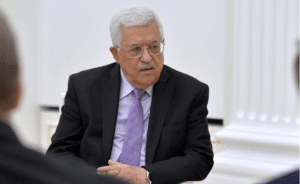After the presentation of the American ‘Deal of the Century’ plan and the recent Israeli government agreement, Israel is taking big steps in planning to annex a large part of the Palestinian West Bank. The Israeli coalition agreement says that its government can, from July 1, begin considering implementing the West Bank annexations as detailed in US President Donald Trump’s Middle East plan. Palestinians worry that if Israel, with the blessing of Washington, carries out this plan it leaves them with heavily conditioned statehood in scattered territorial enclaves surrounded by Israel.
Abbas ends security agreement with Israel and US
As a response, Palestinian president Mahmoud Abbas, has declared an end to security cooperation with Israel and the United States. In a speech he said: “The Palestine Liberation Organization and the state of Palestine are absolved, as of today, of all the agreements and understandings with the American and Israeli governments and of all the commitments based on these understandings and agreements, including the security ones.” The PLO already voted to end cooperation with Israel and the US in 2018 and left it up to Abbas when to implement such a move. Since the Palestinian Authority has threatened to stop such cooperation several times before, Abbas now has to act on it to pass the bar of credibility as a threat. According to Daniel Levy, the president of the US/Middle East Project “We will actually have to see Palestinian action.”
Concrete Palestinian actions
One of the actions that has become clear is that the Palestinians have suspended contacts with the CIA. This followed after announcing an end to security coordination with Israel and the United States. Saeb Erekat, secretary general of the Palestine Liberation Organization, told reporters on cooperation with the U.S. Central Intelligence Agency: “It stopped as of the end of the (Palestinian) president’s speech.” He further added that: “Security cooperation with the United States is no more. Security coordination with Israel is no more. (…) We are going to maintain public order and the rule of law, alone.” It is unclear what other measures the Palestinians will take and also to what extend and for how long the security cooperation is really suspended. Some say the PA’s announcement that it is absolved of all the agreements is a leap in the dark, as there is no clear-cut Palestinian plan for how to dissolve the agreements with Israel. According to Israeli officials, Abbas is wary of following through because he needs Israel’s support in the face of domestic challenges from Hamas.
Jordanian king warns for “massive conflict”
Jordan’s king, Abdullah II, has warned Israel of a “massive conflict” with the Hashemite Kingdom if it proceeds with its plans. “Leaders who advocate a one-state solution do not understand what that would mean,” he said. He suggested that if the Palestinian National Authority collapses, there will be more chaos and extremism in the region. King Abdullah declined to say whether annexation would threaten the Jordan-Israel peace treaty. The strong message from the king is not unexpected. According to observers, Israel’s annexation plan could pose a threat to the Jordanian monarchy. “When the king himself comes out and essentially puts his relationship with Israel and the treaty with Israel on the line, it’s very serious,” senior fellow at the Middle East Institute, Khaled Elgindy, stated. He argues that the end of the two state solution, an end of any prospect of a Palestinian state, poses not only a strategic threat to Jordan, but potentially even an existential threat.
EU undecided about sanctions
Jordan has also been lobbying the EU to take practical steps to avoid annexation. It’s foreign minister called on the international community and the EU to take practical steps that reflect the rejection of any Israeli decision to annex. So far, EU foreign ministers only reaffirmed their support for a two-state solution and opposition to any annexation. The ministers, whose countries are deeply divided in their approach to Israel, agreed to ramp up diplomatic efforts. EU High Representative for Foreign Affairs and Security Policy, Josep Borell said: “We reaffirm our position in support of a negotiated, two-state solution. For this to be possible, unilateral action from either side should be avoided and, for sure, international law should be upheld.” Het further added that: “International law has to be upheld. Here, and there, and everywhere.” Though Borell or other EU representatives have not mentioned the use of sanctions, rather stating the EU will use all its diplomatic capacities.
Sources:
Reuters / Al Jazeera / The Guardian / Morocco World News / The National / Al-Monitor / Photo: Dennis Jarvis



